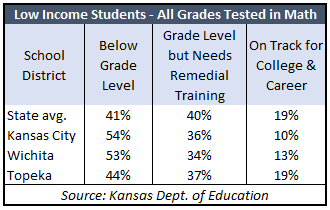Lisa Watson has a calling: to get kids out of failing schools. The Kansas City, Kansas woman is helping organize a school choice symposium on Nov. 2. Watson hopes to provide ‘escape routes’ to parents of students in the worst-performing schools.
“We’re just doing the underground railroad one kid at a time,” Watson said.
 Statewide, 41% of low-income kids are below grade level in math according to the 2018 state assessment results. It’s even worse in urban areas. In Kansas City, Kansas 54% of students are below grade level and only 10% are on track for college and career. The Wichita school district has similar results, with 53% below grade level and just 13% on track.
Statewide, 41% of low-income kids are below grade level in math according to the 2018 state assessment results. It’s even worse in urban areas. In Kansas City, Kansas 54% of students are below grade level and only 10% are on track for college and career. The Wichita school district has similar results, with 53% below grade level and just 13% on track.
Because the public school system places kids in schools based on zip codes, kids can end up trapped in schools that aren’t providing quality education. And that can have lifelong consequences for those kids.
Black students are more likely than their white counterparts to be held back. They’re less likely to graduate from high school. Those black students who do graduate from and enroll in college are less likely than their white counterparts to graduate from college.
Not getting the education they need in elementary and secondary schools is a big factor. Of the Kansas students who took the ACT test in 2018, only 8% of African American students did well enough to be college-ready in English, Reading, Math, and Science; 13% of Hispanic students were college-ready and 34% of White students.
“We are in a state of emergency,” she said. “We are on the Titanic.”
On average, Kansas public schools will receive $15,105 per pupil this school year. Despite record amounts of funding, almost a quarter of all students who graduate from high school will need to take remedial courses as prerequisites to classes for college credit.
Many black parents aren’t getting quality for their educational dollar, according to Watson.
“If you’re getting something decent for your money, I can understand. But us, we’re sending our kids to failure factories. Someone can be 13, 14, 15-years old and functionally illiterate. We’re putting students on a school conveyor belt and they’re not getting the product they’re paying for.”
Watson stresses that the conference isn’t about proposing a one-size-fits-all education solution. Some kids thrive in charter schools. Others find success in homeschools.
“If a private high school is what’s best for you, let’s figure out a strategy or a plan to make that happen,” she said.
Educational freedom can provide a lifeboat and change the family tree of impoverished students, according to Watson. Private schools often offer classes on things like marriage and finances, providing a lifeboat that can change the family tree of impoverished students.
“Imagine a picture of a little boy. Beneath that it says, ‘I’m from a broken home, but my kids won’t be,’” Watson said. “He’s taking a class on marriage. He’s learning from age 5, and he’s changing his family tree.”
Her faith inspired her leap into fighting for quality education, but Watson wasn’t always a Christian.
“I have a lot of leftist credentials,” she said. “I interned with Planned Parenthood. I was an atheist. I worked with the ACLU. I founded a racial justice task force. Everything in my life was a complete social justice warrior.”
A divine encounter set her on a journey to “figure stuff out.”
“It was a two-year unraveling,” she said.
And at the end of that rope, Watson started hatching plans to help children in the urban core find success. Education, she believes, is a way to fight poverty. On one side, she says, people tell the urban community how to collect welfare.
“I’m trying to give kids a good education. One is a cycle of generational poverty and the other breaks the cycle of generational poverty,” she said.
Watson’s infectious passion garnered the support of Americans for Prosperity-Kansas and Americans for Prosperity-Missouri.
“She has a deep passion for educational issues,” Elizabeth Patton, communications director for AFP-Kansas, said. “That is just what she sees to her core as a catalyst to helping society as a whole.”
The daylong event will feature a variety of speakers, panels, and workshops on topics ranging from the state of school choice in Kansas and Missouri, homeschooling while black, and how to start your own charter or private school. Attendees will also learn about scholarship programs like the Kansas Tax Credit Scholarship Program, which provides funding for some kinds in failing public schools to enroll in private schools.
The conference, “Can School Choice Defeat Poverty,” will begin at 8:30 a.m. on Nov. 2 at the Reardon Center in Kansas City, Kansas. A buffet lunch will be included. For more details or to sign up to attend, visit the website at www.edfreedommo.org.


